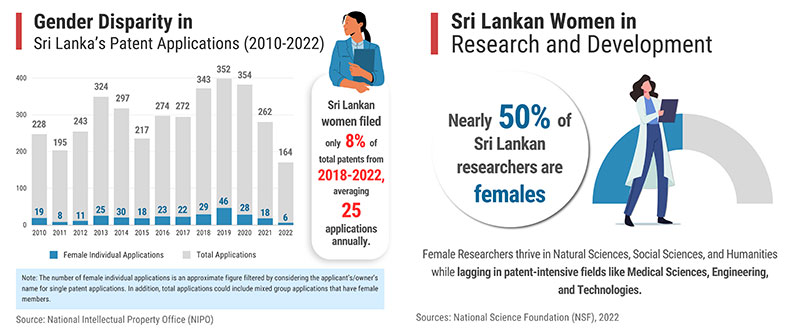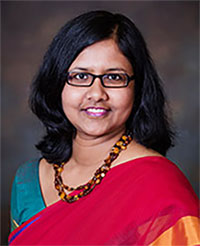Business
Cracking the Code: Why women’s innovations are lagging behind in Sri Lanka

 By Dilani Hirimuthugodage
By Dilani Hirimuthugodage
“I do not intend to get a patent right for my invention as I do not want to disclose my research findings and methodologies to the public domain”, stated a female researcher who has discovered a solution for dengue fever.
Like her, many female innovators are unwilling to obtain Intellectual Property (IP) protection and commercialise their innovations for various reasons. One of the significant issues is the insufficient understanding of Intellectual Property Rights (IPRs) and their application. Given that this year’s World IP Day, observed on April 26, focuses on “Women and IP: Accelerating Innovation and Creativity”, it is timely to explore the state of women’s innovations in Sri Lanka and consider possible strategies to promote better IP protection for women’s creativity and innovations.
Women in Innovations
The number of patent applications issued to women is a crucial and commonly used indicator to determine their involvement in innovation. However, Sri Lanka does not have gender-specific patent application data. Based on approximate calculations, the number of individual female patent applications fluctuated between 2010 and 2022, averaging nearly 25 patent applications per year in the last five years (Infographic 1). This represents only 8% of the total patent applications during that period.
Globally, women’s patent applications are less than men’s; in 2020, nearly 16.5% of international patent applications were filed by women. Sri Lankan women appear to do poorly, especially compared to their Asian counterparts, where women’s applications represent 17.7% of total applications, with China and India leading the way.
Infographic 1:
Gender Disparity in Sri Lanka’s Patent Applications (2010-2022)
Why are Women’s Innovations Low in Sri Lanka?
Women’s involvement in research and development (R&D) activities, one of the key components of innovations, is at a satisfactory level in Sri Lanka. According to the National R&D survey conducted by the National Science Foundation (NSF) in 2020, nearly 50% of researchers in the country are females. This figure is the highest percentage when compared with other South Asian countries. However, in total, the output indicators of R&D, such as the number of patents, journal publications, commercialisation, etc., are low in Sri Lanka. Further, the low number of female patents reveals that most women are involved in less patent-intensive fields, such as natural sciences, social sciences and humanities. Moreover, female researchers are uninterested in commercialising their inventions or using them for commercial purposes. There could be several reasons for this, such as a lack of awareness of IPRs and their importance, lack of incentives and institutional support for research commercialisation, and lack of targeted programmes to promote women’s innovations.
Science, technology, engineering, and mathematics (STEM) are the core fields of innovation. Female STEM education in Sri Lanka is relatively good. According to the University Grant Commission (UGC) statistics, in 2017, women comprised 49% of undergraduate enrolments in STEM subjects in local universities. Yet very few women work or lead in STEM-related fields. This could be attributed to negative stereotypes surrounding girls’ competencies in subjects like mathematics, engineering, and information technology, as well as social, cultural, and gender norms.
Moreover, women’s participation in Sri Lanka’s creative industry sector is nearly 36%, with significant contributions in the product, graphic and fashion design and craft sectors. Nonetheless, the Creative and Cultural Industries in Sri Lanka report reveals that women’s awareness of IPRs, even within the creative industry sector, is very minimal.
What Needs to be Done?
IPRs play a major role in encouraging innovation and creativity as they help to turn an idea/solution into a commercial opportunity. In Sri Lanka, there is clearly a need to encourage more female participation in patent-intensive R&D fields (such as medical sciences, engineering and technologies) and commercialisation. ‘Technology Transfer and Commercialization Units’ in universities and research institutes should collaborate effectively with key stakeholder organisations such as the National Intellectual Property Office (NIPO), World Intellectual Property Office (WIPO), and the National Innovation Agency (NIA) to create awareness amongst women innovators and to support them in managing IP related commercial activities. Furthermore, Sri Lanka can promote gender-inclusive innovation policies by introducing special programmes encouraging women’s participation in R&D activities and commercialisation, including national awards and incentive schemes in universities and research institutes.
Women’s participation in STEM fields and careers should be promoted by providing scholarships and introducing mentoring and development-oriented programmes. Furthermore, the importance of IPRs should be taught in secondary school and university curricula. This fact was highlighted by a young female inventor with more than 60 patent rights in Sri Lanka. She noted that “an inquisitive mind and a thirst for knowledge from school age have encouraged me to innovate. Creativity should be encouraged at the school level”.
It is of utmost importance to raise awareness and strengthen knowledge on access to IPRs amongst women innovators in Sri Lanka. This could be done by establishing women-focused support networking systems, collaborations, learnings through selected role models, mentorship and funding programmes. Countries such as India (Women Scientists Scheme (WOS) by the Department of Science and Technology (DST)), Singapore (Women in Science (SgWIS) organisation), China, and South Korea have programmes and organisations tailored explicitly for women innovators.
Lastly, it is crucial to maintain an accurate and current database of women’s patent applications at individual and group levels at the national database system of NIPO. Simple modifications to patent applications could facilitate this process. In addition, having such a database would be valuable in developing policies specific to women’s innovations.
Link to the full Talking Economics blog: https://www.ips.lk/talkingeconomics/2023/04/26/cracking-the-code-why-womens-innovations-are-lagging-behind-in-sri-lanka/
Dilani Hirimuthugodage is a Research Economist at IPS with research interests in Agriculture and Agribusiness Development, Environment, Natural Resources and Climate Change, and Intellectual Property. She holds a BA in Economics with a Second Class (Upper) and Masters in Economics (Distinction Pass) from the University of Colombo. In addition, she is a part-qualified candidate of CIMA-UK. (Talk with Dilani: dilani@ips.lk).
Business
AHK Sri Lanka champions first-ever Sri Lankan delegation at Drupa 2024

The Delegation of German Industry and Commerce in Sri Lanka (AHK Sri Lanka) proudly facilitated the first-ever Sri Lankan delegation’s participation at Drupa 2024, the world’s largest trade fair for the printing industry and technology. Held after an eight-year hiatus, Drupa 2024 was a landmark event, marking significant advancements and opportunities in the global printing industry.
AHK Sri Lanka played a pivotal role in organising and supporting the delegation, which comprised 17 members from the Sri Lanka Association for Printers (SLAP), representing eight companies from the commercial, newspaper, stationery printing, and packaging industries. This pioneering effort by AHK Sri Lanka not only showcased the diverse capabilities of Sri Lanka’s printing sector but also facilitated vital bilateral discussions with key stakeholders from the German printing industry.
Business
Unveiling Ayugiri: Browns Hotels & Resorts sets the stage for a new era in luxury Ayurveda Wellness

In a captivating reimagining of luxury wellness tourism, Browns Hotels & Resorts proudly unveiled the exquisite Ayugiri Ayurveda Wellness Resort Sigiriya. This momentous occasion, celebrated amidst a vibrant and serene grand opening on the 6th of June, heralds a new chapter in the Ayurveda wellness tourism landscape in Sri Lanka. Nestled amidst 54 acres of unspoiled natural splendour, Ayugiri features 22 exclusive suites and stands out as the only luxury Ayurveda wellness resort in the country offering plunge pools in every room, rendering it truly one-of-a-kind.
The grand opening of Ayugiri Ayurveda Wellness Resort was an enchanting event, where guests were captivated by the melodies of flutists and violinists resonating through Sigiriya’s lush landscapes. As traditional drummers and dancers infused the air with vibrant energy, Browns Hotels & Resorts’ CEO, Eksath Wijeratne, Kotaro Katsuki, Acting Ambassador for the Embassy of Japan and General Manager, Buwaneka Bandara, unveiled the resort’s new logo, marking a significant moment witnessed by distinguished guests from the French Embassy, Ayurveda and wellness enthusiasts along with officials from the Sigiriya area, LOLC Holdings and Browns Group.
“Our strategic expansion into wellness tourism with Ayugiri Ayurveda Wellness Resort Sigiriya symbolises a significant milestone for Browns Hotels & Resorts. Wellness tourism has consistently outperformed the overall tourism industry for over a decade, reflecting a growing global interest in travel that goes beyond leisure to offer rejuvenation and holistic well-being. By integrating the timeless wisdom of Ayurveda with modern luxury, we aim to set a new standard in luxury wellness tourism in Sri Lanka. Whether your goal is prevention, healing, or a deeper connection to inner harmony, Ayugiri offers a sanctuary for holistic well-being” stated Eksath Wijeratne.
Ayugiri encapsulates the essence of life, inspired by the lotus flower held by the graceful queens of the infamous Sigiriya frescoes. Just as the lotus emerges from the murky depths, untainted and serene,
Ayugiri invites guests on a journey of purity and rejuvenation, harmonised with a balance of mind, body and spirit, the essence of nature, echoes of culture and the wisdom of ancient Ayurvedic healing.
Business
HNB General Insurance recognized as Best General Bancassurance Provider in Sri Lanka 2024

HNB General Insurance, one of Sri Lanka’s leading general insurance providers, has been honored as the Best General Bancassurance Provider in Sri Lanka 2024 by the prestigious Global Banking and Finance Review – UK.
The esteemed accolade underscores HNB General Insurance’s unwavering commitment to excellence and its outstanding performance in the field of bancassurance. Through dedication and hard work, the HNB General Insurance team has continuously endeavored to deliver innovative insurance solutions, cultivate strong relationships with banking partners, and provide unparalleled service to customers nationwide. This recognition is a testament to the team’s dedication and relentless pursuit of excellence in the bancassurance business.
“We are honored to receive this prestigious award, which reflects our team’s tireless efforts and dedication to delivering value-added insurance solutions and exceptional service through our bancassurance partnerships,” said Sithumina Jayasundara, CEO of HNB General Insurance. “This recognition reaffirms our position as a trusted insurance provider in Sri Lanka and motivates us to continue striving for excellence in serving our customers and communities.”












